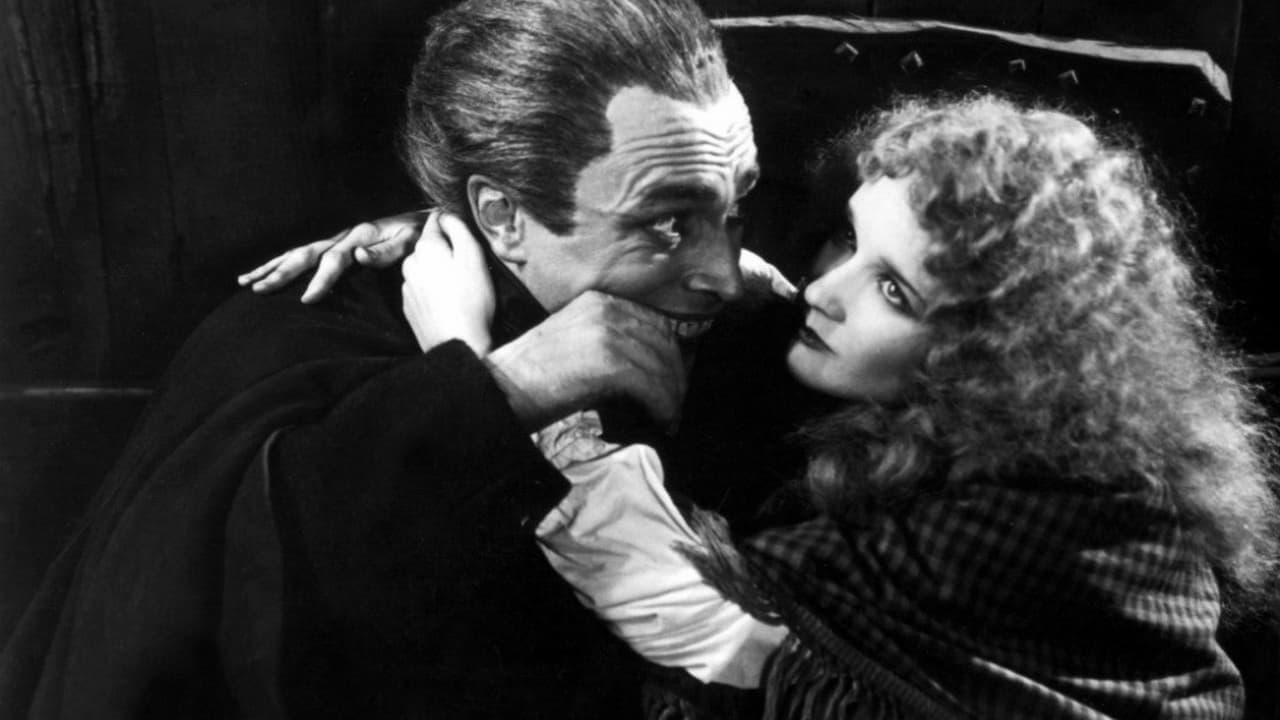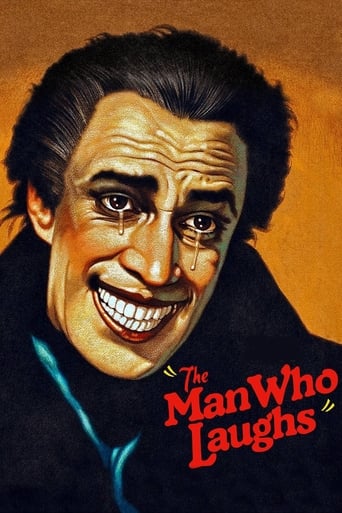

Where people say that smiling is the best cure for sadness, there's never been a story like this that takes a nice and joyful smile that everybody loves to see and make into a curse for a man for the rest of his years. Based on Victor Hugo's 1869 novel L'Homme qui Rit, The Man Who Laughs starred German import Conrad Veidt as Gwynplaine, a carnival freak doomed to live life wearing a perpetual grin carved on his face by Dr Hardquannone (George Siegman because his father, Lord Clancharlie (Allan Cavan), had offended England's King James II (Sam De Grasse). Taken in as a child by Ursus, a mountebank (Cesare Gravina), Gwynplaine grows up alongside the beautiful but blind Dea (Mary Philbin). They fall in love but Gwynplaine refuses to marry her because his hideous face makes him feel unworthy. Queen Anne (Josephine Crowell), meanwhile, has ascended the throne and when she learns from her predecessor's evil jester Barkilphedro (Brandon Hurst) that the recalcitrant Duchess Josiana (Olga Baclanova) is in possession of Lord Clancharlie's estates, she decrees that the royal femme fatal must marry Gwynplaine, the rightful heir. Josiana, who has caught Gwynplaine's act incognito and arranged a rendezvous, is at the same time sexually attracted to and repelled by the "Laughing Man," but Gwynplaine, who realizes that the duchess' attraction has legitimized his right to love Dea, renounces his title and follows his heart to the new World. We have seen many movies and stories where we have seen different kind of extraordinary people and the usual people give out a smile, good or bad, like a superhero users a smile to welcome people of the city and show that he comes in peace, but a villain gives out a smile when his doing something wrong or just loves playing bad. But what about a story about man that has a very usual gift that he views it as a curse, that not everybody as thought off before, even I didn't thought of it. His not a bad guy and his not a hero as well, his just a guy trying to make the best out of life but the smile that sticks on his face that courses all this attention really gives Gwynplaine (Main character) a hard and difficult life. The Man Who Laughs is a silent film that very cleverly get's it's message and it's story across very well and this a silent film with no sound at all and I still felt emotional for the character's in the film.Conrad Veidt played Gwynplanie and through out the film he had a lot of make-up on his face for the effect of the big smile for his character; it must have been really difficult for him to show any emotion by all that make-up, but he nailed it by showing as much emotion as he can by simply his eyes which people say "The eyes are the windows to the soul", and I felt it all that in his eyes, just like Bane from The Dark Knight Rise who had a mask that covered half of his face and still can be scary and the kind of guy that nobody mess with, all by his eyes and Conrad Veidt also did the same thing.All the cast did a great job in their roles and Olga Baclanova can play a right nasty bitch but she did it really well. The directing is really good allowing some really impressive and heart felt moments that the cast and the director got right.My only my problems with the film is that at times it dragged a little bit in some parts, and that's really it for problems.Overall The Man Who Laughs is a freaking fantastic movie with scenes that really played with my heart strings.
... View MoreIn 1869, when Victor Hugo's "The laughing man" appeared, the fairgrounds displayed for over a century not much more than carousels, toboggans and Russian Swings. Since technology was not so far developed as to use electricity like a few decades later, it was the time of the Chambers of Horror, direct antecedents of the later ghost trains or dark rides. However, not long after, it was also the time when the film was born, and it is surely no change that the first movies often showed horror scenes and that the general horror-topic was one major issue of the European film until the outbreak of World War I.Chambers of Horror, in which like 5-legged calves, Siamese twins, two-headed chicken or the mutilated mouth of Gwynplaine were the attractions of the fairgrounds, even much more than the waxworks that were en vogue at the same time. People like the Elephant Man, Gwynplaine or Cesare from the "Cabinet of Dr. Caligari" could earn a living by giving their performances on the fairgrounds. Basically, we are dealing here with the small gap between attraction and repulsion. It is hard to explain why people are driven to see what they do not want to see and whose picture they will possibly never bring out of their heads anymore. In the case of Gwynplaine it is the constant grinning, a feature which is normally temporary and depending on a situation that irritates, and it seems that irritation is one of the key-elements from which fair-grounders live (the irritation of the senses on the roller-coaster, the irritation of the nerves by watching the Elephant Man). Nowadays, the Chambers of horrors are disappeared, modern medicine has brought to vanish the Sardonic laughs, the hare slips and divided the Siamese Twins. But their places haven been taken over by modern figures of horror whose original inspirations may have been those guys out of those cabinets where nature was shown its own mistakes.
... View MoreAfter finally getting to see The Man Who Laughs all the way through, I am struck by how good Conrad Veidt was and also what a wonderful Dracula he would have made. For those who don't know, instead of Tod Browning directing Bela Lugosi in Dracula, we very nearly had Paul Leni directing Veidt as Dracula. Leni's untimely death in 1929 ended that delightful possibility. The scenes in which Veidt hides his carved mouth bring home what an ideal vampire profile he had. And of course, Veidt always oozed of menace when the camera was on.That is one reason his work here impresses me so much. For once he is cast as a sympathetic figure and carries it off quite well. Horrific, pathetic and sympathetic, his Gwynplaine is a complicated character and one of the more memorable ones of the silent era. Of course Mary Philbin is an angel and gives probably her best performance as Dea. Brandon Hurst is wonderfully smarmy as the lecherous jester and steamy Olga Baclanova is great as the spoiled duchess who likes to let her hair down and play with the peasant class. Cesare Gravina is also touching as the kindly Ursus. In fact the whole cast is strong from Josephine Crowell as Queen Anne to Zimbo the Dog as Homo!Of course Leni, in one of his final films, shows his usual deft touch. What a shame it was that two of the silent era's best directors, Leni and Murnau, never got a chance to explore sound film.The Man Who Laughs isn't that easy to find, but is well worth looking for.
... View MoreIn jolly old England, Julius Molnar Jr. (as young Gwynplaine) has a permanent grin surgically carved on his face "so he might laugh forever at his fool of a father" who refused to kiss the hand of his King. The disfigured lad rescues a blind baby, and they are adopted by fatherly Cesare Gravina (as Ursus). The children grow into Conrad Veidt (as Gwynplaine) and Mary Philbin (as Dea). The trio support themselves as a traveling freak show, featuring Mr. Veidt's "The Laughing Man" grin, which has become ever more grotesque with age. Still blind, but movie-star-beautiful as an adult, Ms. Philbin falls for her good-natured rescuer; she thinks God took her eyes so that she could see the good in "Gwynplaine". Veidt cares for Philbin, but is distracted by the possible love of a sighted woman, the seductive Olga Baclanova (as Duchess Josiana).Paul Leni's "The Man Who Laughs" makes up for a story that goes to the dogs (quite literally!) by being too beautifully produced to dismiss. Additionally, Veidt's performance is electrifying. Especially representative of his work in this film is Veidt's "seduction" scene, with Ms. Baclanova; and, she is surely the film's "Best Supporting Actress". Everyone, from Philbin to extras and bit players, is very good. Interestingly, Veidt was eligible for an Academy Award, but was not nominated. Then, neither was Lon Chaney, for "Laugh, Clown, Laugh". They had no sense of humor, obviously. ******** The Man Who Laughs (4/27/28) Paul Leni ~ Conrad Veidt, Mary Philbin, Olga Baclanova, Brandon Hurst
... View More